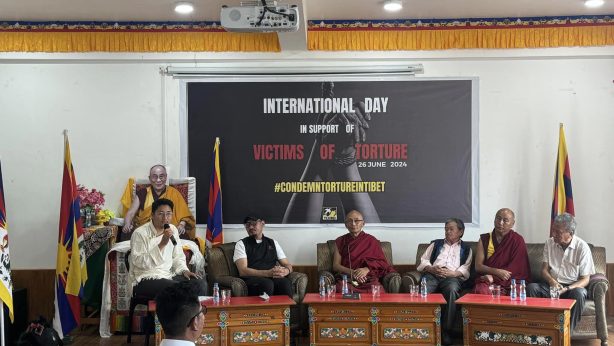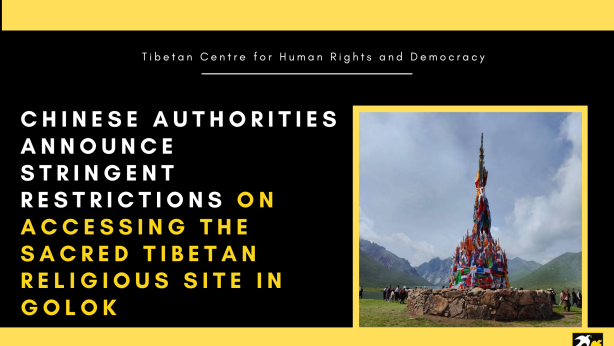Theurang: Fighting for universal human rights is an act of seeking truth
Tashi Rabten (pen name: Theurang) is a Tibetan writer and poet who is serving a four-year sentence in Mianyang Prison, Sichuan Province. He graduated from North-West University for Nationalities and wrote for the now-banned Tibetan language journal “Shar Dungri” and also published “Written in Blood”, a compilation of his poems, notes and writings on the situation in Tibet following the 2008 protests.
On the fifth anniversary of 14 March 2008 protest in Lhasa, TCHRD has translated and edited one of Theurang’s essays written before his arrest and subsequent imprisonment in 2009. The essay was republished in exile in the book “Reflections on 2008 Protests: a Collection of Essays by Tibetan Intellectuals in Tibet”, by Domey Editorial Committee, Dharamsala, India.
Freedom and democracy belong to those who fight for them
By Theurang
Freedom and democracy are fundamental aspirations of human beings. Every human being and nation on this earth is heading

towards democracy, equality and freedom, leaving behind oppression and exploitation of dictatorship and slavery. For the values of democracy and equality, many great men and women gave up their lives. On this earth beneath the vast sky, although freedom and democracy belong to the entire humanity, they will never belong to those who oppress by practicing dictatorship. Be it individuals, organisations, governments or nations, it is a universal truth that those who oppress by practicing dictatorship, their hands and legs will be crushed under the rolling boulder called freedom, equality and democracy. For many years, we have been fighting for our rights—for the values of equality, freedom and democracy. We have been raising slogans and banners for them. Fighting for universal values of human rights is an act of seeking truth. We are not afraid of any one. No one can stop us.
Since 2008, Tibetans inside and outside Tibet have pursued many campaigns such as protests, fasts, peaceful marches and other commemorative events. These non-violent campaigns reflect the agonising thirst of the Tibetan people for freedom and democracy. They expose the political system and policies of the People’s Republic of China under which we are living. Our campaigns are not to secure freedom and democracy for Tibetan people only. They reflect the growing aspirations and hopes of peoples and nations who yearn for freedom and democracy. Many nations and peoples on this earth support our struggle.
Any nation or people aspiring for democracy must respect the life of every individual citizen without any discrimination. Amid our non-violent struggle, however, we witnessed ‘some ugly incidents of looting, burning, smashing and killing.’ Such incidents violate human rights and sacredness of human lives and thus pollute, and are a blot on, the non-violent struggle of our people. Moreover, these horrible incidents tarnish our movement in the eyes of other peoples and nations, contradict the vision of peace espoused by the noble Gyalwa Rinpoche and negate a people fighting for truth and justice.
Since we do not have military might, we cannot pursue an armed struggle. The only solution we have is non-violent protests that express our opposition to lies and oppression of Chinese government. It is extremely important that such non-violent protests are organised in countries and among nationalities that cherish democracy and freedom. While campaigning for freedom, many of our brave fellow Tibetans lost their lives to guns while many underwent enormous suffering walking thousands of miles on peaceful marches. If you are a Tibetan nurtured on milk and tsampa, if Tibetan blood is running into your veins, you have to speak up and campaign for Tibetan freedom. You cannot support dictatorship and slavery. I have heard that some Tibetan leaders [working for Chinese government] are criticising our freedom struggle. In Chinese newspapers and televisions, some Tibetans are condemning it. The Tibetan nation cannot be represented simply by Tibetans living under Chinese rule, leave alone by a few Tibetan residents of Lhasa. Moreover, those reactionaries who have become tools of Chinese oppression cannot represent the Tibetan people. This truth should be made clear to the world. In our campaign for freedom, many Tibetans have lost their lives. Rather than accepting this truth, China is attempting to hijack our non-violent struggle. We must send true information and pictures of our protests to the outside world. We must mention the number of Tibetans killed and arrested, slogans raised by protestors and places where protests were held.
“A true and verified picture of an injured Tibetan is more valuable than [poorly-verified and thus hard to prove] information about the death of a hundred Tibetans,” a friend once told me. This is true. No matter what campaign we pursue, we must not pursue them in haste—that is without any strategic planning. Nor should we resort to violence. Moreover, our educated folks must write appeal letters on behalf of Tibetans who were arrested and disappeared in some places. All these information must be propagated throughout the world. In short, freedom and democracy belong to those who fight for them. They will never belong to those who murder democracy and freedom by practicing dictatorship and slavery. If we do not lose our pride and determination, Tibetan people will have a chance to taste democracy and freedom one day.


